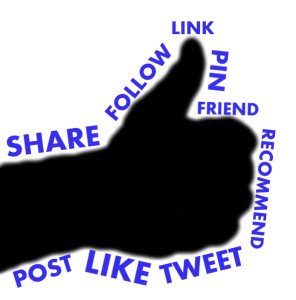by gabriel_sales | Mar 3, 2014
 B2B professional service companies are a rare breed. The sometimes abstract nature of the service makes for a tough sale and a longer sales cycle than most. These companies therefore need all the help they can get in terms of sales and marketing, so knowing where your buyers are evaluating your services is key to a successful sales process.
B2B professional service companies are a rare breed. The sometimes abstract nature of the service makes for a tough sale and a longer sales cycle than most. These companies therefore need all the help they can get in terms of sales and marketing, so knowing where your buyers are evaluating your services is key to a successful sales process.
In a recent survey reported by MarketingProfs, it was found that the two most common places people go to evaluate professional services companies are the company’s website (81%) and search engines (63%). Beyond that, buyers ask friends or colleagues if they have heard of the company (62%), look to social media (60%) and ask a reference the company provides (56%). The survey also found that buyer used an average of 3.2 methods in their evaluation process.
While these findings are not surprising, there are several conclusions that can be drawn.
1. It makes sense for professional service firms to devote significant resources to their website and invest time in leveraging it as a sales tool.
If 81% of your buyers are heading straight to your website to evaluate your services, your website better be set up to allow them to do that. A homepage with a “sign up for our newsletter” link is no longer enough. Professional services companies’ websites need to include readily available content that:
2. Professional services firms need to use social media—if only for evaluation/vetting purposes.
B2B professional service firms are never going to be the most buzzed about thing on social media. But, if 60% of buyers look to social media in their buying process, it makes sense to at least have a presence there. The same survey found that LinkedIn is by far the most commonly used social platform during evaluation of professional services companies (70%). Twitter is only used 5% of the time and 25% of buyers check Facebook, Google or other social networks.
So, while posting constantly on Twitter might not be worth the time for professional services firms, setting up company profiles on LinkedIn, Google and Facebook is probably worthwhile. You may not need to post updates everyday, simply having an active company profile is sometimes enough to be seen as a credible, 21st century business.
3. For professional services companies to be most effective, one tactic is not enough.
With so many places to get information today, buyers are leveraging multiple resources over the course of their buying process. This suggests that to be most effective in their sales and marketing efforts, they need to leverage a variety of sales and marketing tactics to meet their buyers everywhere they are looking.
Because professional services buyers are looking an average of 3.2 places during their evaluation process, focusing only on your website—or only on SEO, or only on social media—is not enough. Professional services companies need to simultaneously work and monitor all spaces where prospects are engaging to produce the best results.
For more sales tips of B2B professional services sales, read 10 Sales Strategies for Professional Service Firms. Feel free to contact us with any questions.
by gabriel_sales | Jan 24, 2014
 40% of Americans now use Facebook everyday. Whether we are aware of it or not, I think this has had some interesting effects on marketing.
40% of Americans now use Facebook everyday. Whether we are aware of it or not, I think this has had some interesting effects on marketing.
Most of us now scroll through our various social media feeds a couple of times throughout the day, and as we do, we constantly see Youtube videos, memes, Buzzfeed and Upworthy-type content—all competing for likes and shares.
This creates the impression that going viral and getting shares is the ultimate goal to be achieved. And for marketers, it fuels the desire to create marketing content that will make those ‘like’, ‘share’ and ‘retweet’ counts jump into the thousands.
While there is nothing inherently wrong with that approach, marketing content should always have a goal that is tied to business. If your only goal is brand awareness, trying to create viral videos or blog posts is a good strategy—viral content gets seen by more people. However, if your goal is to put prospects into the pipe or close deals, going for viral might not be appropriate.
This is because being viral does not equate directly to having value (i.e. cat videos). Turning the thousands of viewers of your content into prospects and leads generally requires providing some sort of value. What exactly that value is will vary greatly depending on the product or service.
In the B2C space, providing entertainment might be enough value to initiate a purchase. There is a lot less risk purchasing B2C products, which allows more room to be impulsive. In the B2B space however, where purchases are sometimes multimillion dollar enterprise software solutions, content that provides a few laughs is not likely going to be enough to get a contract signed.
In more complex, higher-risk sales, creating content that is valuable should trump your desire for creating content that goes viral. Content that provides value in these complex sales includes opinion’s of thought leaders, industry reports, software demonstrations, product comparisons, case studies, etc. This type of informative and fact-based content enables prospects to educate themselves on your product or solution, so they are able to make an informed purchase decision. While this type of content may not be as exciting or share-worthy as the latest Volvo ad, it does provide the type of value that will build enough trust to motivate a high-risk purchase.
If you would like to know more about creating valuable B2B marketing content, read “5 Reasons Your Content Isn’t Converting.” Feel free to contact us with any questions.
by gabriel_sales | Oct 21, 2013
 In the whizzing world of social media, it seems like everyday, at least one of your platforms has a new feature, functionality or update. You finally get used to your new homepage or profile layout, and Facebook changes it again the next day.
In the whizzing world of social media, it seems like everyday, at least one of your platforms has a new feature, functionality or update. You finally get used to your new homepage or profile layout, and Facebook changes it again the next day.
If you want to use social media as a part of your B2B marketing strategy, it pays to be in the know of the constant changes these sites make. While not every change may lead to a change in your strategy, it is good to make sure you know what’s going on, so all of your bases are covered.
Here are 3 Recent Changes in B2B Social Media Marketing
1. Google wants your blogs to be more relevant and less keyword-obsessed.
Google started using a new search-algorithm in late August called ‘hummingbird’ that is semantic-based and is supposed to be more conversational. In terms of written content like blogs, this means that simply throwing the same phrase or keyword in there 10 times is no longer going to do anything. Google now rewards high-quality, original blog content that truly answers the question it says it does. Google has also started featuring an “In-depth Articles” section on some search results pages, which means we could see an increase in the average length of blog posts.
2. (Almost) Everything is searchable on Facebook now.
Earlier this year, Facebook released its Graph Search, which allows users to search for people via “likes” or other demographic details (subject to privacy settings). Last month, the functionality of Graph Search expanded to include status updates, photo captions, check-ins and comments in search queries. This new search capability makes it easier to find information regarding a specific place or topic and will also help open up a new audience for businesses doing online marketing.
3. Twitter has a new recommendation notification.
The pace that Twitter moves makes it hard to keep up with everything and everyone you have interest in. If you aren’t on Twitter 24/7, it is likely you are going to miss something like a great retweet or a prospect you could have followed. @MagicRecs was released last month by Twitter to help eliminate this problem by giving you “personalized recommendations when multiple people in your network follow the same user or favorite or retweet the same Tweet.” Using @MagicRecs, you can stay on the pulse of Twitter with no little to no effort on your part.
If you’d like to learn more about Google’s recent changes, click here. If you have any questions or need help with B2B social media marketing, feel free to contact us.
 B2B professional service companies are a rare breed. The sometimes abstract nature of the service makes for a tough sale and a longer sales cycle than most. These companies therefore need all the help they can get in terms of sales and marketing, so knowing where your buyers are evaluating your services is key to a successful sales process.
B2B professional service companies are a rare breed. The sometimes abstract nature of the service makes for a tough sale and a longer sales cycle than most. These companies therefore need all the help they can get in terms of sales and marketing, so knowing where your buyers are evaluating your services is key to a successful sales process.


